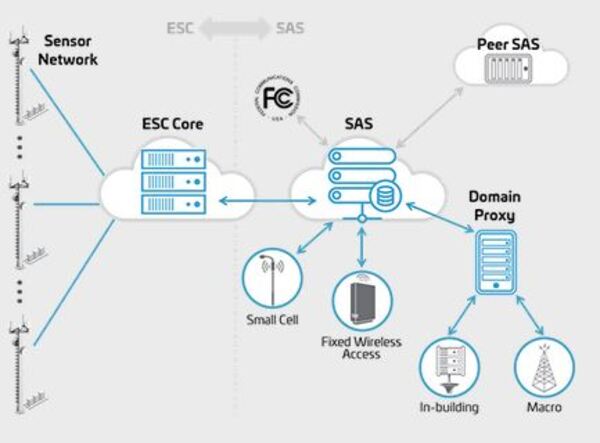CommScope and Google are working together to jointly develop, deploy and operate an Environmental Sensing Capability (ESC) network, advancing Citizens Broadband Radio Service (CBRS) to market. The joint ESC leverages the technical capabilities of each company with a consolidated footprint – resulting in more places to deploy CBRS and higher availability spectrum for operators of CBRS-based networks.

The CBRS band is 150 MHz of 3.5 GHz spectrum, which will be shared by the current incumbents, including federal government radar systems, and new commercial users. CBRS will provide new dynamically-allocated shared spectrum for various use cases such as private networks, fixed wireless access, wireless rural broadband, indoor wireless coverage, the Internet of Things, and additional cellular capacity. The FCC has authorized shared use of the band, which enables the support of commercial wireless services while protecting incumbent use.
CBRS spectrum is managed by Spectrum Access Systems (SASs), which require an ESC network to sense radar operation. The ESC will alert the SASs of naval radar operations, so the connected SAS systems can reconfigure spectrum allocations for nearby CBRS devices to operate without interfering with naval activity.
CommScope and Google will each provide independent SAS services and jointly operate the ESC network. The ESC network is engineered for high availability with the built-in redundancy and fault detection necessary to provide this key enabling capability. As part of this collaboration, both companies share responsibility for overall network design.
Google has developed the ESC sensor and cloud decision engine and will operate the cloud that communicates with each SAS. CommScope will deploy and manage the operation of the physical network. CommScope and Google are working with the FCC and other governmental agencies to obtain certification of the ESC.
“The ESC represents more than a check-the-box capability. To effectively manage spectrum, a SAS relies on accurate ESC notifications - that eliminate false positive readings - from a high availability sensing network,” said Milo Medin, vice president of Wireless Services at Google. “We are excited to work with CommScope toward the success of CBRS.”
—END—
About CommScope:
CommScope (NASDAQ: COMM) helps design, build and manage wired and wireless networks around the world. As a communications infrastructure leader, we shape the always-on networks of tomorrow. For more than 40 years, our global team of greater than 20,000 employees, innovators and technologists have empowered customers in all regions of the world to anticipate what’s next and push the boundaries of what’s possible. Discover more at http://www.commscope.com.
Follow us on Twitter and LinkedIn and like us on Facebook.
Sign up for our press releases and blog posts.
News Media Contact:
Bill Walter, CommScope
+1 708-236-6634 or publicrelations@commscope.com
Financial Contact:
Phil Armstrong, CommScope
+1 828-323-4970
Google Contact:
press@google.com
This press release includes forward-looking statements that are based on information currently available to management, management’s beliefs, as well as on a number of assumptions concerning future events. Forward-looking statements are not a guarantee of performance and are subject to a number of uncertainties and other factors, which could cause the actual results to differ materially from those currently expected. In providing forward-looking statements, the company does not intend, and is not undertaking any obligation or duty, to update these statements as a result of new information, future events or otherwise.
Source: CommScope
